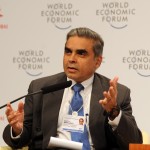With a note of regret, Kishore Mahbubani predicted that East Asia would not be a priority for the new US administration. In an article published in May 2008, the dean of the Lee Kuang Yew School of Public Policy in Singapore heralded an Asian century in which the US is struggling to find its place:

“No country did more than the United States to spark the rise of East Asia. But paradoxically, America is among the countries leas prepared to handle the rise of East Asia. Evidence of this will likely stream in as soon as a new US president assumes office in January 2009. The president’s schedulers will begin to fill his or her calender with “must attend” events such as Group of eight meetings and a US-European Union summit. The schedulers will fill the “optional” column with events such as visits to Tokyo and Beijing, Asia-Pacific Economic Cooperation (APEC) summits, and meetings with the Association of Southeast Asian Nations (ASEAN). If this happens, it will demonstrate that Washington’s priorities continue to be decided according to old mental maps. Few US policy makers seem aware that Western domination of world history is over – that we are moving into an Asian century […]”
Mahbubani must be surprised by the new US administration, which decided to send their Secretary of State and former presidential candidate Hillary Clinton to what he supposed to be second-rate destinations in East Asia: Tokyo, Jakarta, Seoul and Beijing are the capitals Clinton will be visiting on her first trip abroad this week.
It is possible that the newcomers in the White House have read Mahbubani’s advice to “prioritize meetings across the Pacific over meetings across the Atlantic”. However, Mahbubani is likely to remain skeptical. In his article, he criticizes the hub-and-spoke policy of bilateral arrangements the US has been pursuing with its partners in East Asia. Rather than relying on an US-centered Asia-Pacific economic and security architecture, or worse, preventing East Asian countries from creating strong international institutions among themselves, as US policy makers have done in the past, he urges the new US administration to promote the nascent East Asian frameworks for regional cooperation, such as APEC and ASEAN. “America”, in the words of Mahbubani, “should rediscover the virtue of multilateralism”.
By sending Vice President Joe Biden to the Munich Security Conference last week, the Obama administration gave a clear signal that it does not intend to prioritize East Asia over Europe. It seems that for the White House there is no trade-off between emphasizing Europe and emphasizing Asia. After the Bush administration’s neglect of diplomacy it is possible for the Obama administration to say: “We prioritize both, meetings across the Pacific and meetings across the Atlantic”. Whether this, in the case of East Asia, also includes encouraging multilateralism is a question unanswered so far.

